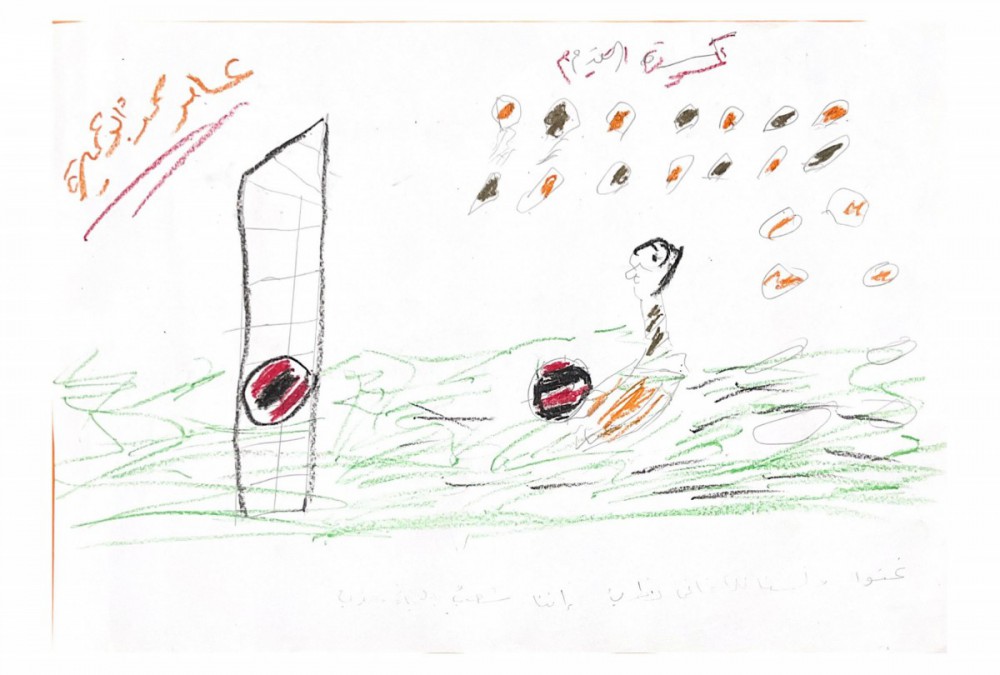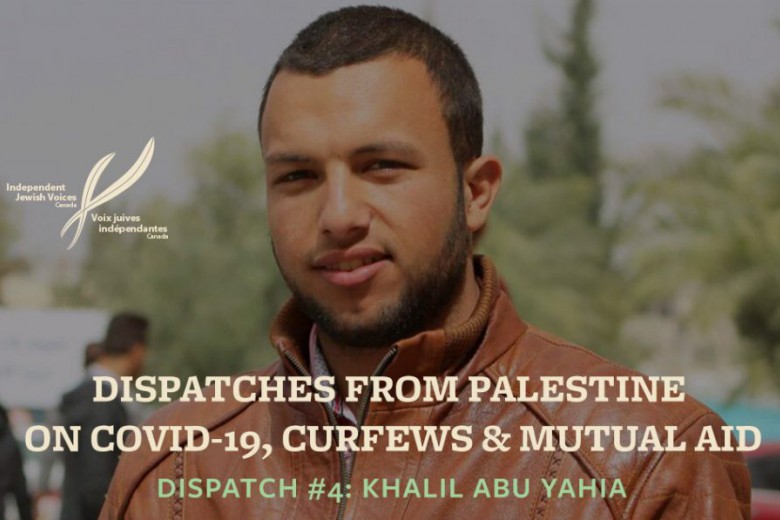In a small building in Nablus, about a dozen people gather in circle at an art therapy workshop. “When your neighbour passes the ball to you, introduce yourself to the group and tell us about something you love,” I instruct the group. I sense the group is feeling shy and hope this activity might help break the ice.
This workshop was a part of series I facilitated for Gazans who were in the West Bank when Israel began its genocidal attack on Gaza in October 2023. They’ve been living in dorms together since, unable to return home to their families and communities, and unsure who is alive and if their homes are still standing.
At the beginning of the workshop, I could sense the group’s walls were up and I needed to earn their trust. I began sharing about my trip to Gaza in 2023 to do art therapy workshops – the places I visited and the people I met. We soon realized how many people we knew in common, and which favourite haunts we had all frequented.
As an art therapist, I try to give people an outlet to release their sorrow and express themselves. With this group, I wanted to create a supportive dynamic where they felt comfortable confiding in each other and supporting one another. Although I’m only with them once a week, they’re together 24/7.
Each week we work with a different medium, including illustration, clay, collage, and music, around a new theme. For this workshop, participants drew the answer to the question: “If you could time travel, where would you go?” Most participants drew their homes. I interviewed three about their illustrations, Israel’s war on Gaza, and their wishes for Gaza’s future.
Dr. Abdullatif Dawood
Age: 78, Born 1946
Place of Residence: Gaza City

Jasem Shuman (JS) Tell us about yourself.
Dr. Abdullatif Dawood (DR. AD) I was born in 1946 in the al-Majdal city of Asqalan. I [have] lived through many incidents of Israeli aggression since the Nakba, which continues today. During the Nakba, my family and I took refuge in a nearby field and when we returned to our house later, we found parts of it completely destroyed after it was bombed by the enemy’s fighter jets. So, we left for Gaza after we lost our house and safety.
JS Can you describe your illustration?
DR. AD This drawing is an expression of the war, an unjust war against a people repressed for the past 76 years. It expresses the desire for peace, which is opposite to what is happening nowadays. I drew a military tank waging war against people, bombing food aid for those in need, and killing Palestinians. Their bodies are shattered everywhere alongside parts of the food aid truck. The sea, Gaza’s beach, where I drew the palm tree, represents peace, goodness, and generosity. The tree gives us fruits every year.
JS What has impacted and bothered you most during the war?
DR. AD I’m most bothered that this is a war against civilians, against hospitals, against places of worship, and against women, children, newborn babies. I consider this a barbaric war; a genocide.
Before this most recent Israeli aggression on Gaza, we used to get electricity for only four to six hours per day. It was cut for the rest of the time. During this war, electricity has been completely cut off. This has made many of us anxious because we are cut off from our families, and unable to find out news about them without internet and cellular reception. During the bombings, we all feel anxious to find out if our families were bombed, if they are okay or not. Electricity is really important because most of the home appliances need electricity to work, in addition to hospital supplies and health care centres. All surgical operations and intensive care units need electricity to operate.
JS Dr. Abdullatif, if I ask you to point to the element you hate the most and the element you love the most on your drawing, where would these two points be?
DR. AD The element I hate the most is here [points to the military tank] and the element I love the most is the sea [points to the fishing boat in the sea].
Nabil Shkukani
Age: 66
Place of Residence:
Nuseirat Refugee Camp, Gaza

JS Tell us a bit about yourself and your drawing.
Nabil Shkukani (NS) I work in construction. I am married but do not have any children. I spend most of my time by the grapevines and olive and lemon trees. Sometimes my friends join me and we sit on the ground, light a bonfire to cook or make coffee, and go for strolls on the beach.
I drew a beach, a boat with fishermen, one person paddling and throwing the fishing net while the other person navigates the boat’s engine. I also wrote a verse of poetry that reads “Sing, let us rejoice in song. We are a people tormented in this life.” [poet unknown]
I wish I was on this boat fishing with my dear friend, Safi. I usually throw a fishing rod and we drink tea while we wait. I’m in love with the sea, to be honest.
The sea is a 15-to 20-minute walk away from my home or a three-minute drive. I unload my worries to the sea because the sea stores the sorrows and secrets. If you throw something bad it will float, and if you throw something precious and valuable like a secret it will sink deep and the sea will treasure it for you, for the sea knows the value of secrets. The sea is tranquility and calmness, and the only friend that protects secrets.
At the bottom I drew a palm tree and another naked, bare tree with no leaves because life is over. Life is not beautiful anymore – I swear to God, life is not beautiful, it has no fruits.
JS Where are we now in this drawing? And where is the place that you would love to be?
NS [Nabil points to the dead tree first, indicating where we are now, and then to the sea so as to show where he would like
to be.]
I haven’t visited the sea since August of 2023. For the past eight months, we have been away from our brothers, our people, our families, and our homes. Our homes were bombed, and our siblings, people, and cousins martyred. Here [in the West Bank], we are unable to do anything. Our bodies are here, but our minds and hearts are in Gaza. We are a diaspora! There is nothing left! There is nothing left to cry over. Crying is no longer useful, and drawing is the outlet I have now. I scream sometimes, anyone that bothers me I just scream at them, even though sometimes it is a trivial issue. I no longer have a sea to unload my sorrows to.
JS Is there anything else you would like to add?
NS Jasem, please visit us more often. I find my sea in these art sessions.
Amer Abu Ameira
Age: 63, Born 1961
Place of Residence:
Shati’ Refugee Camp, Gaza

JS Can you introduce yourself?
Amer Abu Ameira (AAA) I was a soccer player in the good old days. Lately, we’ve been deprived from practising this hobby due to lack of water and electricity in Gaza, which are necessary for any soccer field. I used to play soccer at the Ras al-Hirba Centre with the al-Shati’ Club. Our uniform was blue like the sea waves. I live on al-Rashid Street, which parallels the coast where the refugee camp is. The Shati’ Club is actually named after the refugee camp that was set up on the beach.
Our team won the league championship in 1985. The league was across the entire Gaza Strip, but during the same year we played another club from Nablus and we won, too. We also played against the Hebron Club, which was the winner of the championship. In the first five minutes of the match, they scored a goal. After that first goal, one of their players said that this is the first goal from the five they intend on scoring in our net, but we succeeded [in flipping] the game. The match ended with three goals to one in our favour. We went home carrying the cup that day.
JS Tell us about your art piece, captain Amer.
AAA In this drawing, as it is clear, I drew a soccer field, the fans, the green grass of the field, the net, and myself scoring a penalty goal.
JS Do you still play soccer?
AAA I no longer play soccer, but I visited the club on a daily basis to hang out, watch the youth practise, and talk about the sport together. During Ramadan, we would start a small league for 50-year-olds. My small team was called the Black Panthers, which won this small league five times in a row.
I really miss the soccer club and I miss the days we played soccer. The club was destroyed in the war, and the house was also destroyed, farewell to them. Everything was destroyed. May we return safely soon.
JS If you return to Gaza will you rebuild the club?
AAA The club has to be rebuilt. This is essential. The club is our home and our souls are tied to it. We have to rebuild it and prepare it for our children, loved ones, and friends so they can learn to play soccer and train, and release their energy.
Insha’Allah the club will return, Jasem. Gaza will return and you will visit us there. We will be honoured to have you with us and we’ll take you to the beach. We’ll go fishing and we’ll barbecue together.
*Thank you Aseel Qazzaz for translating these interviews from Arabic.



_780_520_90_s_c1.jpg)
_780_520_90_s_c1_c_c.jpg)


